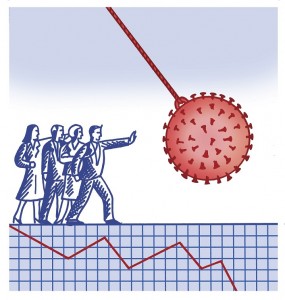Pakistan’s Post-pandemic Economy
Challenges and way-forward
While the novel coronavirus-caused Covid-19 pandemic is causing massive economic disruption across the globe, Pakistan’s fragile economy is confronting an unprecedented economic crisis. Before the outbreak of the pandemic here, the economy of Pakistan was reeling under vices like worrisome joblessness, soaring inflation, rising food insecurity, widening fiscal deficit and, above all, plummeting gross domestic product (GDP). Now, the outbreak of pandemic has multiplied these challenges and is making Pakistan head towards yet another irreversible economic disaster.
Since Pakistan has been prioritizing defence expenditure and allocating a major chunk of GDP to non-development spending at the expense of social sectors, particularly healthcare infrastructure, it has failed miserably to tackle disastrous virus and save demographics effectively and efficiently. What is more disturbing to note is that the pandemic has exposed economic and governance-led fault lines, leading to dire socioeconomic implications for the country.
During the current fiscal year, i.e. FY2020-21, Pakistan is likely to incur an economic loss of approximately Rs2.5 trillion with fall of remittances by $5billion because of unemployed foreign workers; and declining total revenue generation by $6 billion owing to the almost-dysfunctional Federal Board of Revenue (FBR). A major part of these losses can be attributed to the subsequent lockdown imposed by the governments of the federating units though unclear, inconsistent and distorted stance adopted by PTI-led federal government which was disturbingly, surrounded by debate: “Either to save lives or livelihoods.”
One of the destructive impacts of lockdown is shutting down of business operations which resulted in huge layoffs. For instance, Karachi, a metropolitan city and the country’s economic hub, houses 2700 factories out of which merely 45—those in food and pharmaceutical sectors— were operating after the imposition of lockdown. This led to a devastating impact on the supply chain and daily-wagers—the most vulnerable segment of the population—who, therefore, were increasingly finding it hard to make ends meet.
While central and provincial governments are gradually easing restrictions, the World Health Organization (WHO) has warned that miscalculated move aimed at economic recovery without considering potential resurge of the virus could lead to irreparable and untenable damage to the economy and all its sectors.
However, not only Covid-19 is a daunting challenge to the global community, but locust swarms also pose a significant threat to food security. Oxfam, a multinational charitable organization which seeks to eliminate poverty, has recently unveiled a grim picture of food insecurity by saying that 12000 people worldwide could lose their lives every day due to hunger associated with pandemic by the end of 2020. This is because the global food supply has been disturbed greatly, restricting adequate food supply to the impoverished masses.
Keeping this sorry state of affairs in mind, it is pertinent to mention that Pakistan’s already dwindling agriculture sector faces an existential crisis due to locust attacks, making it unable for the country to fulfil the needs of the burgeoning population. Along with that, the halt in trading activities and lack of imports of essential food items have also severely compounded food security challenges for Pakistan. This has led to an increase in the prices of food items, followed by short supply. However, many fear that the inaccessibility of affordable food items will certainly worsen the socioeconomic conditions of the poverty-ridden people, forcing them to engage in criminal activities, resulting in social disorder.
On the other hand, the services sector of Pakistan—the largest contributor to GDP—has witnessed enduring damage since the Covid-19 penetrated the country. Some of the most affected sectors are tourism, sports, education, restaurants, travel and aviation. As people have been maintaining social distancing and quarantines to prevent the spread of the virus, so they are not engaging in travelling and entertainment activities. All this has limited Pakistan’s potential to generate much-needed revenue to combat Covid-19 and govern the country.
The Covid-19 has also caused demand and supply shocks which have added to an already immense pressure on the external sector. Export volume has been on a downward trajectory by 3.9% with declining imports by 16.2%. The latest Economic Survey indicated that factors instrumental in falling exports are currency overvaluation, energy outages, lack of competitiveness and reduction in international commodity prices. Moreover, it was reported that major export destinations of Pakistan, i.e. China, the USA, and Middle Eastern countries, have either cancelled or deferred their orders. Confined operations at Karachi Port have added fuel to the fire, causing a huge decline in exports.
Considering numerous ills ailing Pakistan’s economy, the state of Pakistan needs to find out, and put in place, a workable and robust policy framework to kickstart and turn around the economy in a highly effective manner. A series of endeavours to revamp economy may include:
- Boosting up the construction sector
The construction sector plays a vital role in the economy. What is significant to note is that this sector is greatly labour-intensive, employing millions of working-age people and daily-wagers. Over 40 sectors are, directly or indirectly, connected with the construction industry such as brick, cement, steel and wood industry.
For that, Prime Minister Imran Khan has announced a much-needed revival package for the construction and housing sector. This will certainly not only help lower down joblessness but will also increase the demand for the products of industries that contribute to the constructor industry.
Together with this, tax amnesty has been offered to encourage the business community to invest in building projects without being subject to scrutiny or investigation. A subsidy of Rs30 billion has also been announced for the low-cost housing, aimed at providing affordable housing to the marginalized people.
- Expanding social safety net programme
Given the deteriorating economic conditions, the PTI-led government has come up with the relief package under Ehsaas Programme which is a step in the right direction. The package of Rs1.2 trillion was announced with a cash transfer of Rs12,000 to deserving households for 4 months. As many as 12 million households have received the said amount, enabling them to ensure survival during these hard times.
Hafiz A. Pasha, a noted economist and former federal finance minister, while painting the sorry state of the economy, has argued that an unconditional cash transfer scheme was a much-needed effort which should be expanded and continued for an indefinite period as approximately 50% of Pakistan’s population is expected to fall below the poverty line due to the Covid-19 pandemic.
- Facilitate SMEs
Looming recession and a threat of huge unemployment compelled the incumbent government to allocate Rs100 billion for the promotion and facilitation of SMEs. Young, especially women, entrepreneurs are encouraged to start up their own business while seeking an easy loan facility offered by the government. This way, people who lack financial and economic resources to establish their firms would be able to get lucrative loans.
However, this is not only what corporate entities require. Investors need to be attracted through a variety of structural reforms such as eliminating bureaucratic bottlenecks, building business-friendly infrastructure, financial and non-financial incentives, and so on.
- Reducing interest rate
Amidst unfavourable ramifications of Covid-19, the State Bank of Pakistan (SBP) had to come into play and adopt multiple measures. One of the important steps taken by SBP was reducing the policy rate from 13.25 percent to 9 percent—it was further reduced to 7 percent later. This was certainly a welcome development, as a higher interest rate was a major hurdle for investors and business professionals in doing business in the country. With the GDP growth rate declining, policies of credit expansion to sustain employment in firms are a need of the hour.
Not only this, but lower interest rates also attract foreign direct investment (FDI) which is a perfect recipe in the case of Pakistan. An inflow of ‘hot money’ in the country will flourish business activity and generate economic opportunities for unemployed youth. Strategies are required to create a favourable environment for global investors.
Conclusion
A sound economy is indispensable for national security, strategic relations with countries, and domestic socio-political fabric of the country. As the economic downfall of Pakistan is quite severe, the country ought to initiate tough economic and political reforms to make its economy move towards stability. Negotiating imperative bailouts from friendly nations as well as multi-national financial lending platforms, i.e. IMF and WB, will offer an economic stimulus to Pakistan’s economy. Last but not least, global cooperation to revitalize world economies is what is needed the most in the post-Covid-19 world.
 Jahangir's World Times First Comprehensive Magazine for students/teachers of competitive exams and general readers as well.
Jahangir's World Times First Comprehensive Magazine for students/teachers of competitive exams and general readers as well.



